30 YEARS OF FREEDOM REFLECTION
A ‘beautiful, imperfect journey’ — a photographer recalls the ‘near miracle’ of SA’s 1994 election
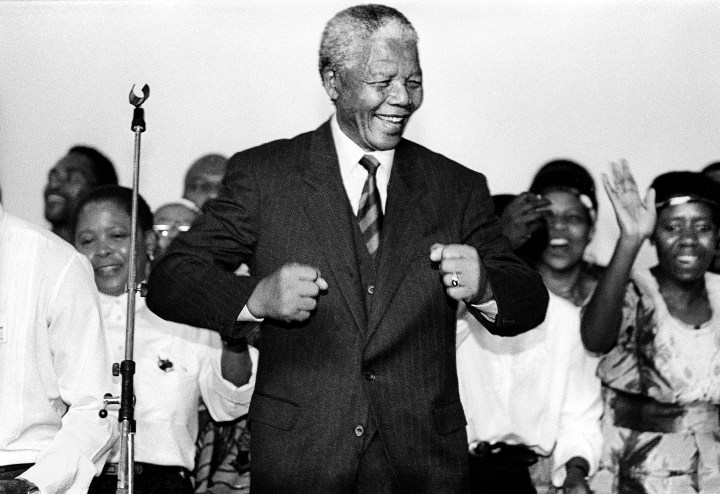
From February to May 1994, I was commissioned by the Independent Electoral Commission to cover its work and document the election process. It was the high watermark of my journey as a documentarian engaged intimately with the Struggle for freedom. This was, at last, the final process that ushered in a free, democratic South Africa. It was a privilege to be on the inside track. The book that celebrated the journey was fittingly called ‘An End To Waiting’. Thirty years later, here are my reflections.
The long, winding road through Inanda passes Kwa Mashu, Phoenix, the Gandhi Settlement, the squatter community of Bambayi that abuts it, Adams College, Inanda Seminary, John Dube’s farm, and scattered small Shembe Churches with white rocks placed in circles, signifying spiritual sites of its devotees. The peri-urban sprawl, punctuated with shacks, rural Zulu homesteads and more modern houses, is endless and a stark reminder of how people made their homes, defying the logic of apartheid urban planning.
Many of these places in the landscape trigger memories that are intrinsically part of our freedom story. The Gandhi Settlement is where Gandhi lived for 10 years (1904-14) and where the Indian Opinion was printed. John Dube, living nearby, wrote prolifically about Zulu history and black life and published a contemporaneous newspaper, called Ilanga laseNatali. Both were pioneers in enabling the expression of black South African voices, the non-enfranchised and dispossessed. My journey ends at Ohlange High School founded by Dube, founder of the ANC. It is here that Nelson Mandela will vote for the first time. The symbolism inscribed in this momentous occasion is not lost on me. This is simultaneously the school where Struggle icon Dube is buried and the site of a contested battle for power, where the Inkatha Freedom Party has strong support and has reigned supreme for many years.
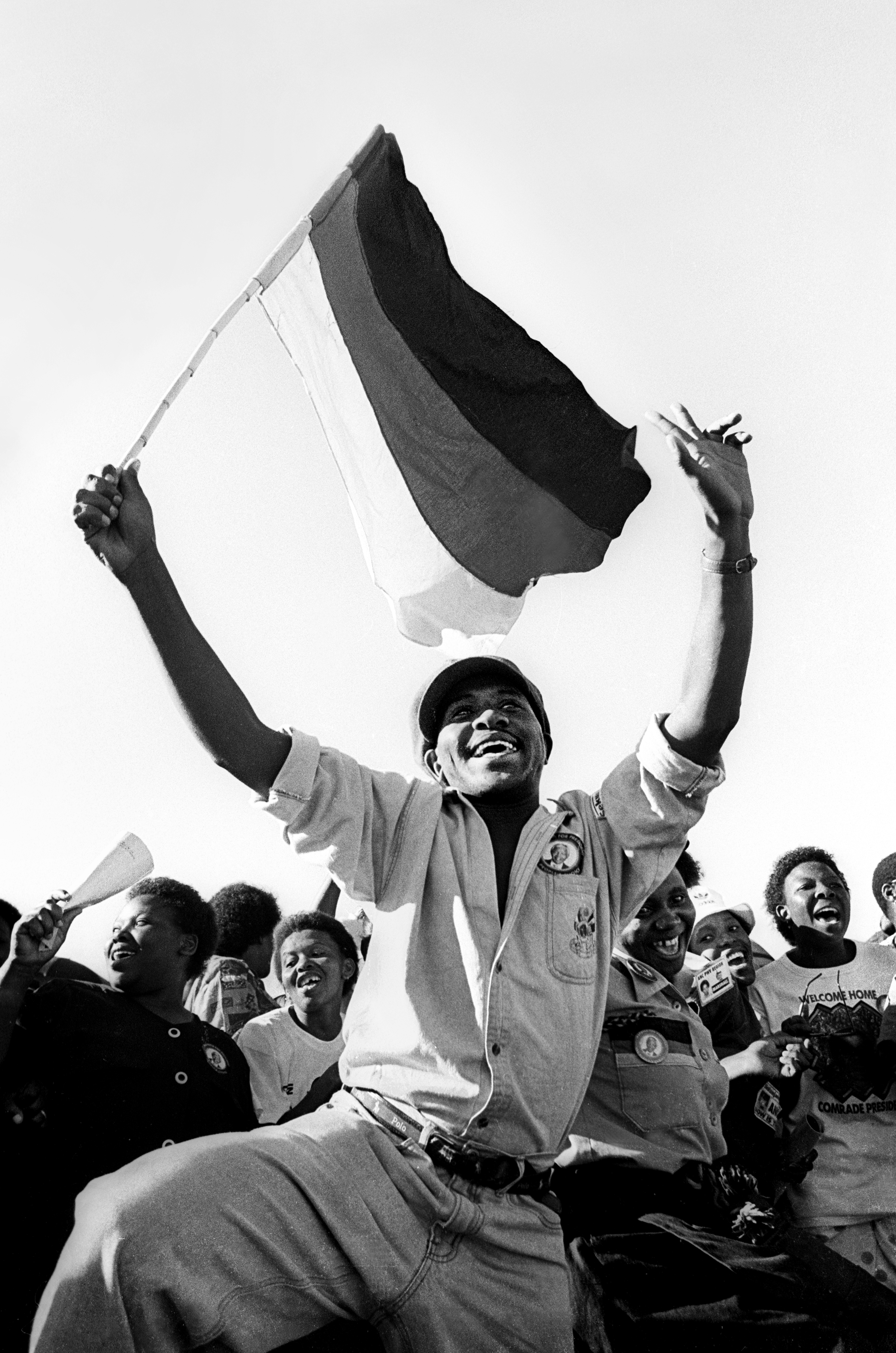
An rally in Sebokeng, Gauteng, in the run-up to the historic elections in April 1994. (Photo: Paul Weinberg)
Even though I am early, there are hundreds of photographers, journalists and TV crews in place. A ballot box sits on the wall of the school’s veranda, anticipating Mandela’s arrival and vote. The jostle begins, just like I had experienced when Mandela was released from Victor Verster Prison, for the best place to record this moment in history. Tensions are running high. But I have a golden ticket. I slip around the back of the building and present my crumpled official letter, giving me access to all voting stations, to the presiding officer. Without a blink, he lets me into the school hall that has been transformed into a voting station, the real voting station. What a relief, but I can’t escape the heavy weight of history on my shoulders. I am nervous.
The ballot box has been positioned against a backdrop of windows. This is not great but I have no say in the choreography of this political performance. I take a number of light meter readings, double check that my film is in the sprocket, and do all those over-anxious things that photographers do, when they are walking with history. And then suddenly Mandela arrives with an entourage. Clutching his arm is Gay McDougall, a civil rights lawyer from the US and an IEC commissioner. Her eyes light up when she sees me. “I need a photograph of me with Mandela,” she informs me. My heart sinks. This is not even her beat. KwaZulu-Natal fell under the jurisdiction of advocate Dikgang Moseneke, with whom I had already made a number of trips.
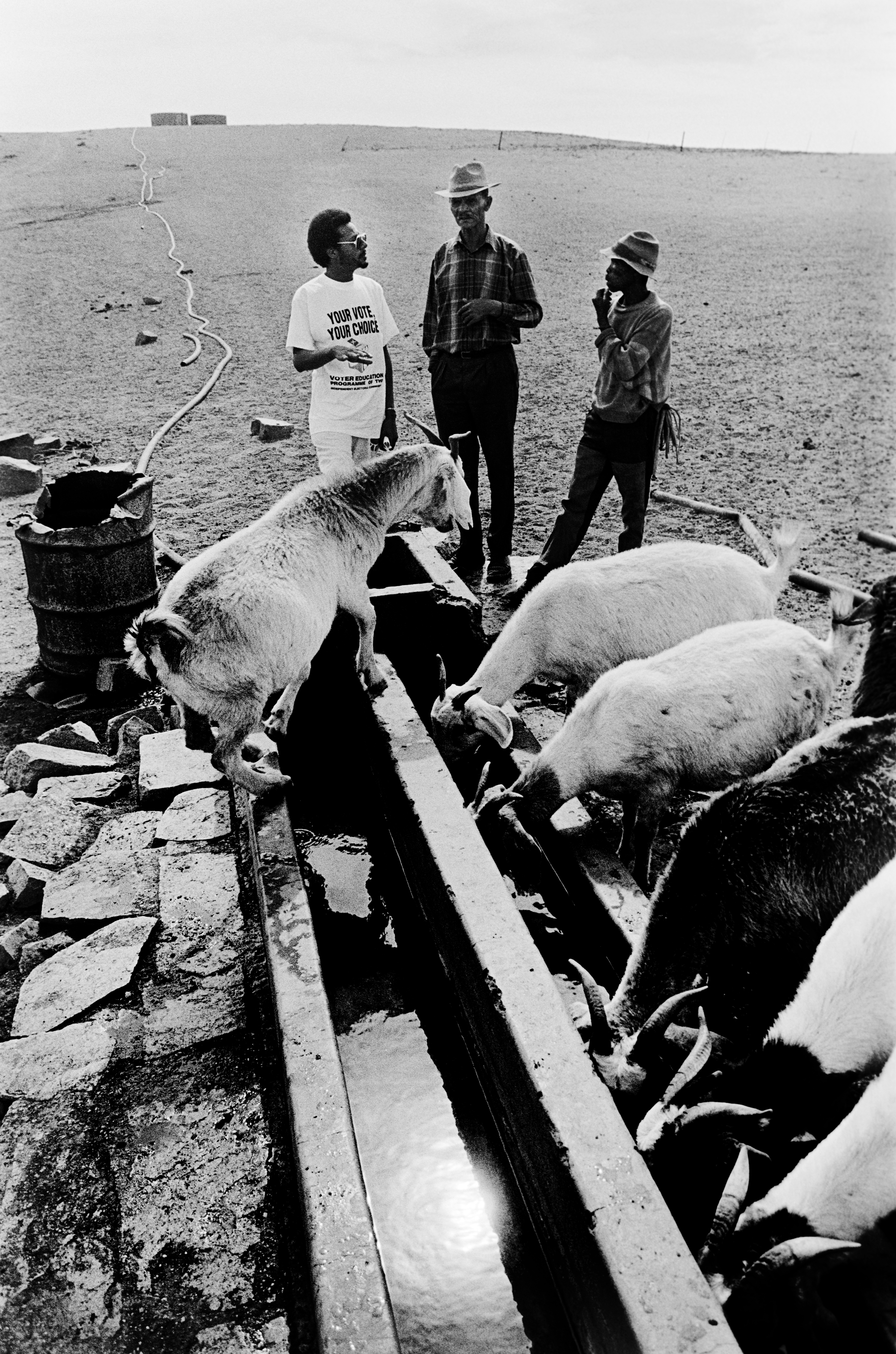
Voter education in the Richtersveld during the IEC’s Operation Access campaign for the 1994 elections. (Photo: Paul Weinberg)
Mandela registers, and then the anticipated moment arrives. Dressed in his now popular Madiba shirt, he is like a child, brimming with joy. On either side and slightly behind him are Jacob Zuma and Bantu Holomisa, whom history will later reassess. He holds the ballot above the box for a few seconds and then drops it. He votes for a second time outside, on the veranda, for the large press gathering. McDougall, still clutching his arm, is in every photograph and video clip dispatched around the world. There is back-up for her project. I process the images and to my delight, despite my concerns about shooting into window light, they are fine. I deliver, as requested, the image she had asked for. The only element of Gay McDougall is her hand touching Mandela’s arm on the far right of the frame. But I am about to learn that this is not the end of the story.
Judge Kriegler and commissioner Oscar Dhlomo sat nervously wringing their hands as speaker after speaker rallied the crowd in Zulu.
The next day I received a phone call from the Associated Press. “I have a moral obligation to release this image to the world,” says the bureau chief. In exchange they will offer me $400. I say I’ll think about it, and never call back.
Two days earlier I had been in Diepkloof prison, photographing the vote. The arrival of ballot papers and boxes, as happened quite often throughout the election, was delayed. Prisoners began banging and shouting. It reached a crescendo, as we waited expectantly for an explosion. To make matters worse one of the ballot boxes was damaged. The rod that slid into the hole was blocked, which meant the box could not be sealed. The presiding officer was out of her depth and flustered. Stepping into the frame, I said with an authority I didn’t possess: “Let’s simply drill a hole to enable the box to be sealed and submit an affidavit that this is what was required under the circumstances.” In no time, a technician from prison services arrived with a drill and opened the blocked hole. The storm was avoided and the prisoners added their votes to the national ballot.
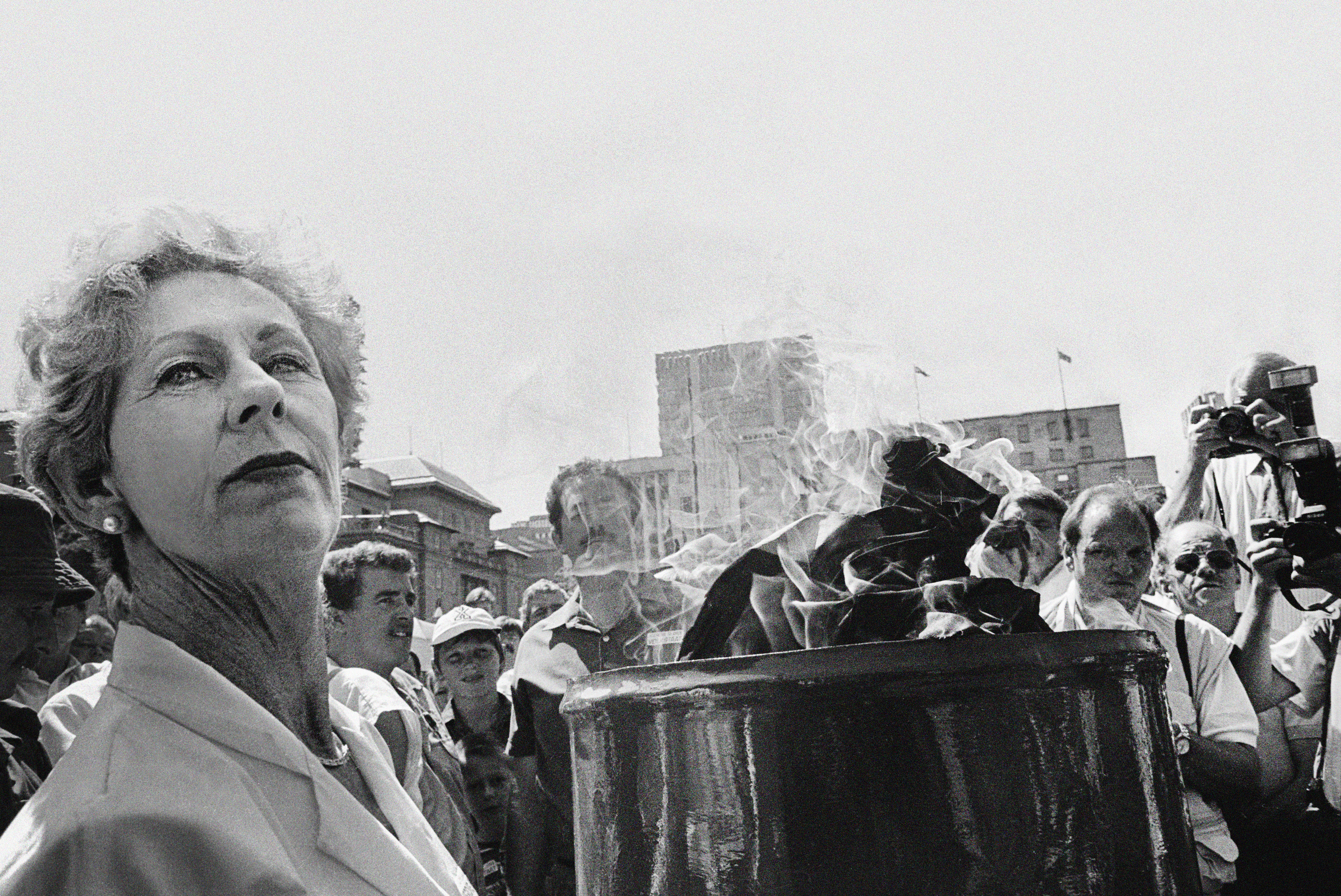
A right-wing protest in Pretoria, in the run-up to the 1994 election, in March 1994. (Photo: Paul Weinberg)
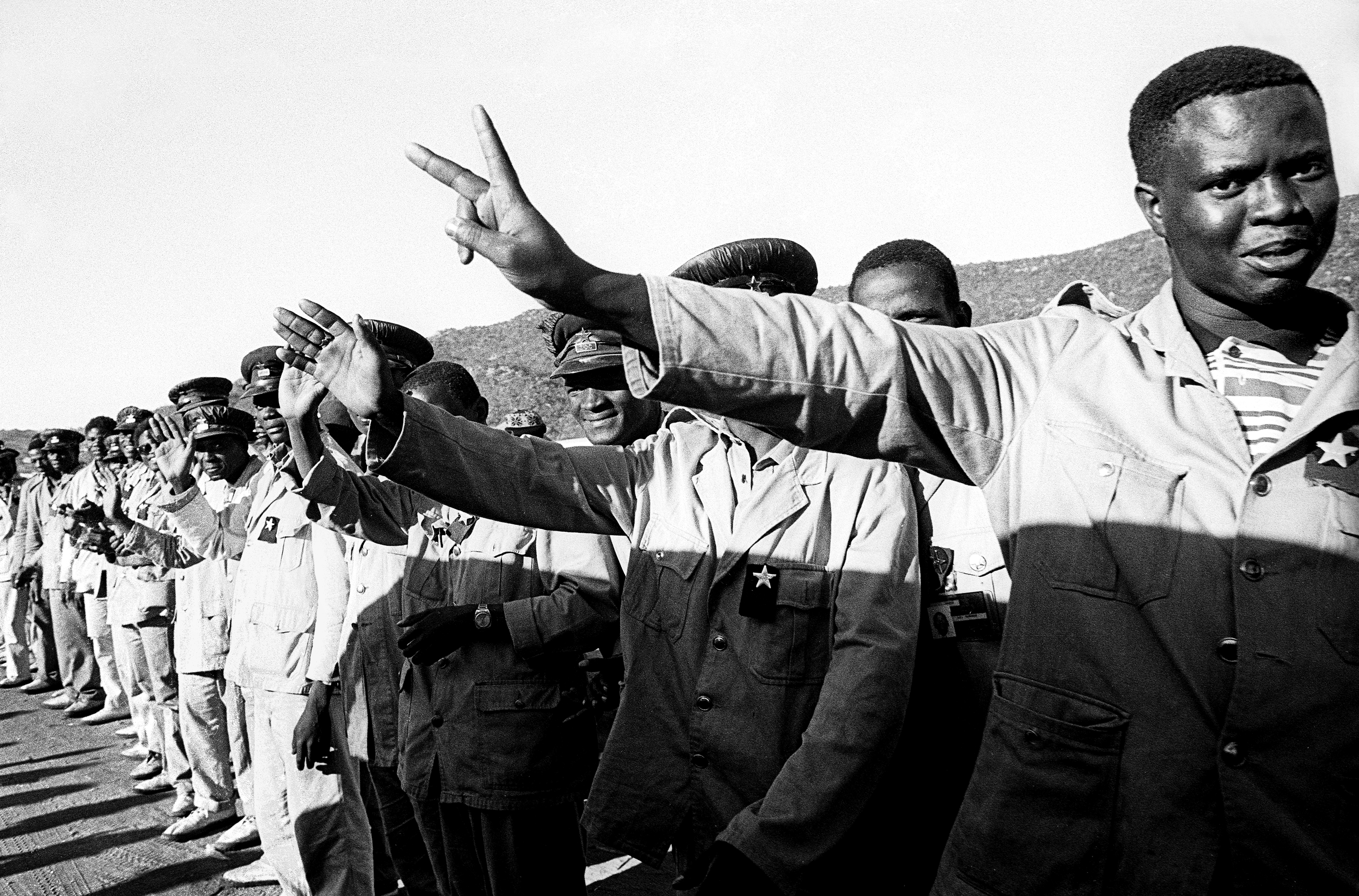
Moria, Northern Province: The Independent Electoral Commission visits the Zion Christian Church in the run-up to the historic elections that brought democracy to South Africa, on 26 March 1994. (Photo Paul Weinberg)
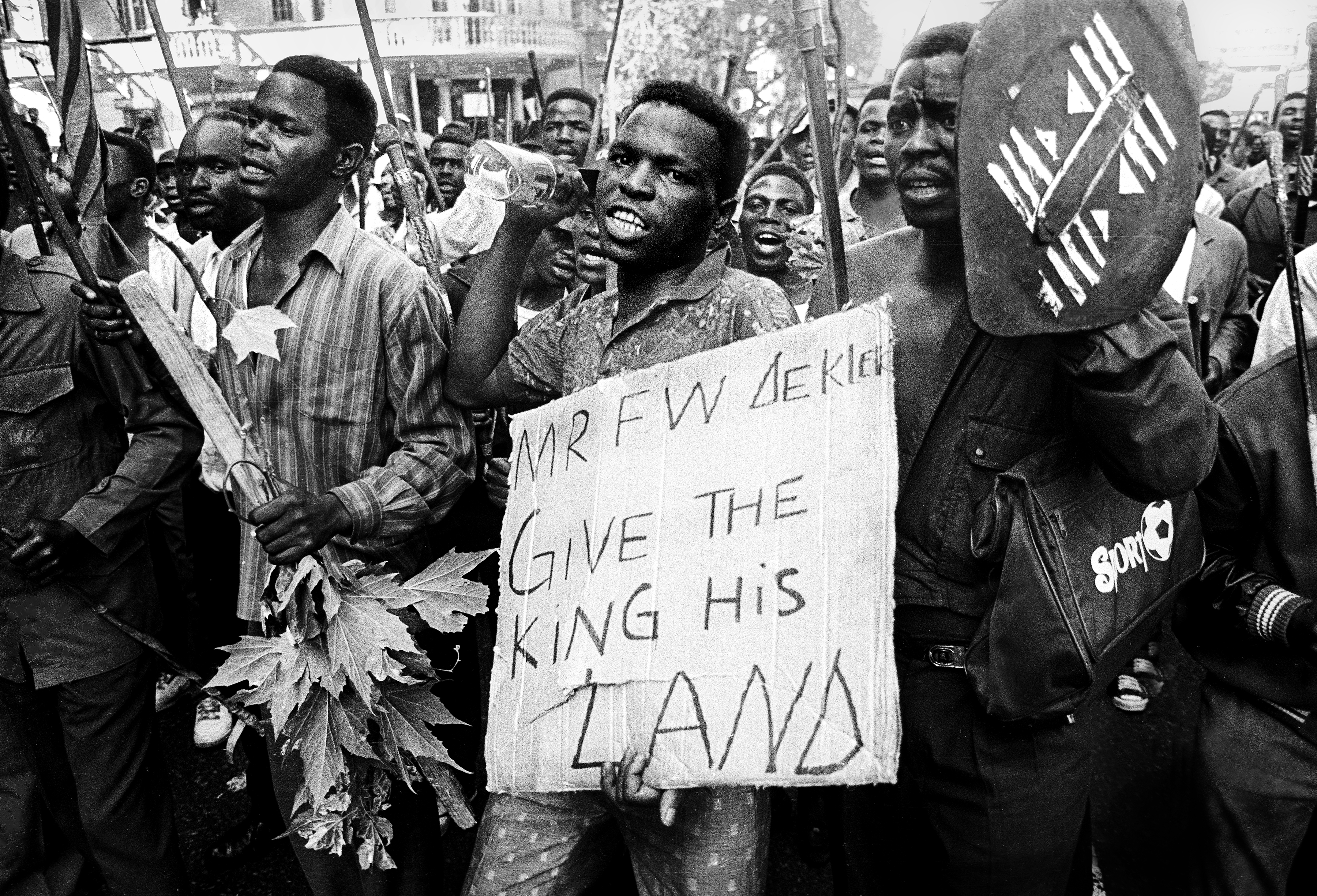
IFP supporters march through Johannesburg before the historic elections on 27 April 1994. (Photo: Paul Weinberg)
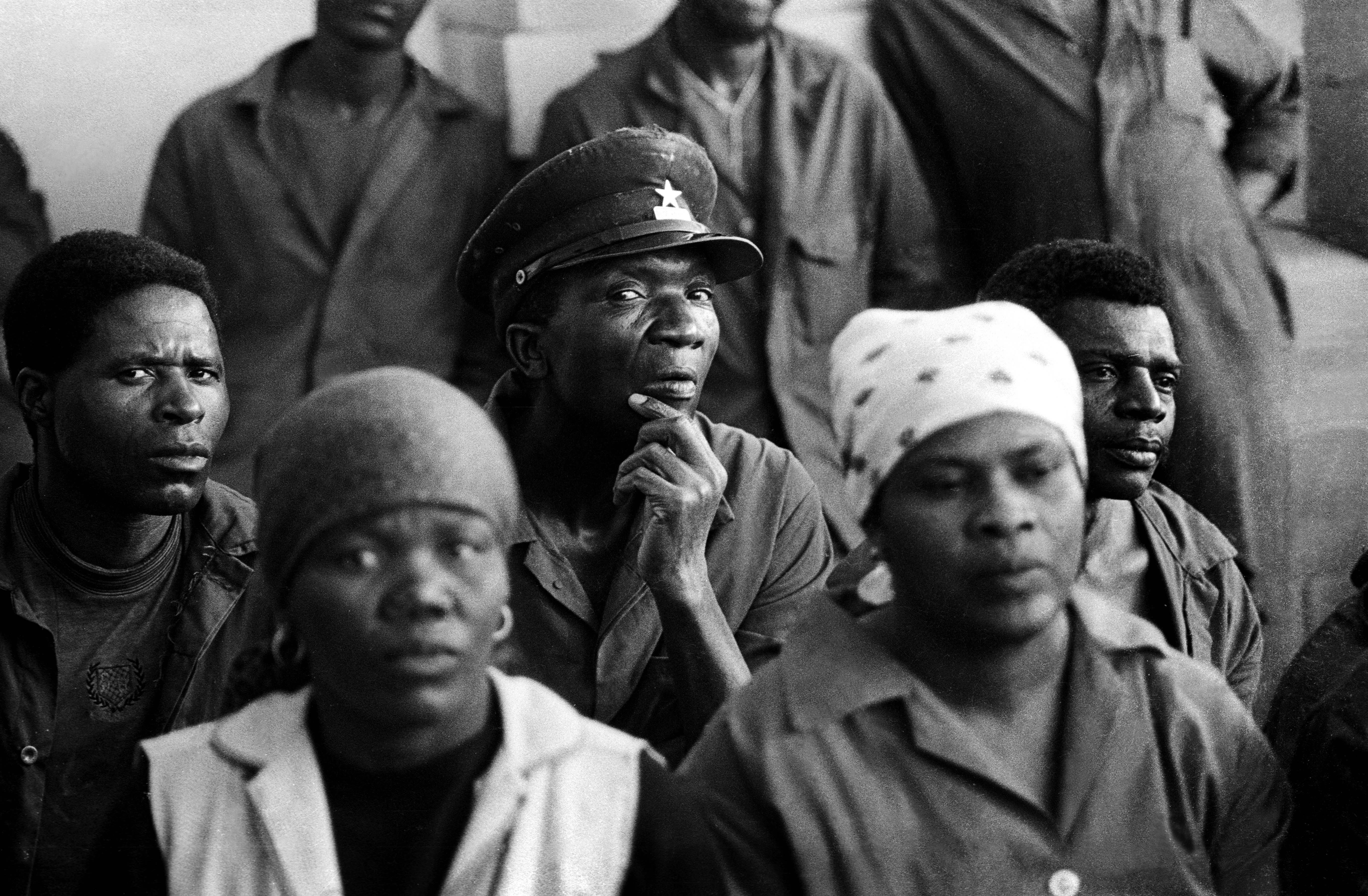
Johannesburg: The IEC ran voter education campaigns in the run-up to the elections on 26 March 1994. (Photo: Paul Weinberg)
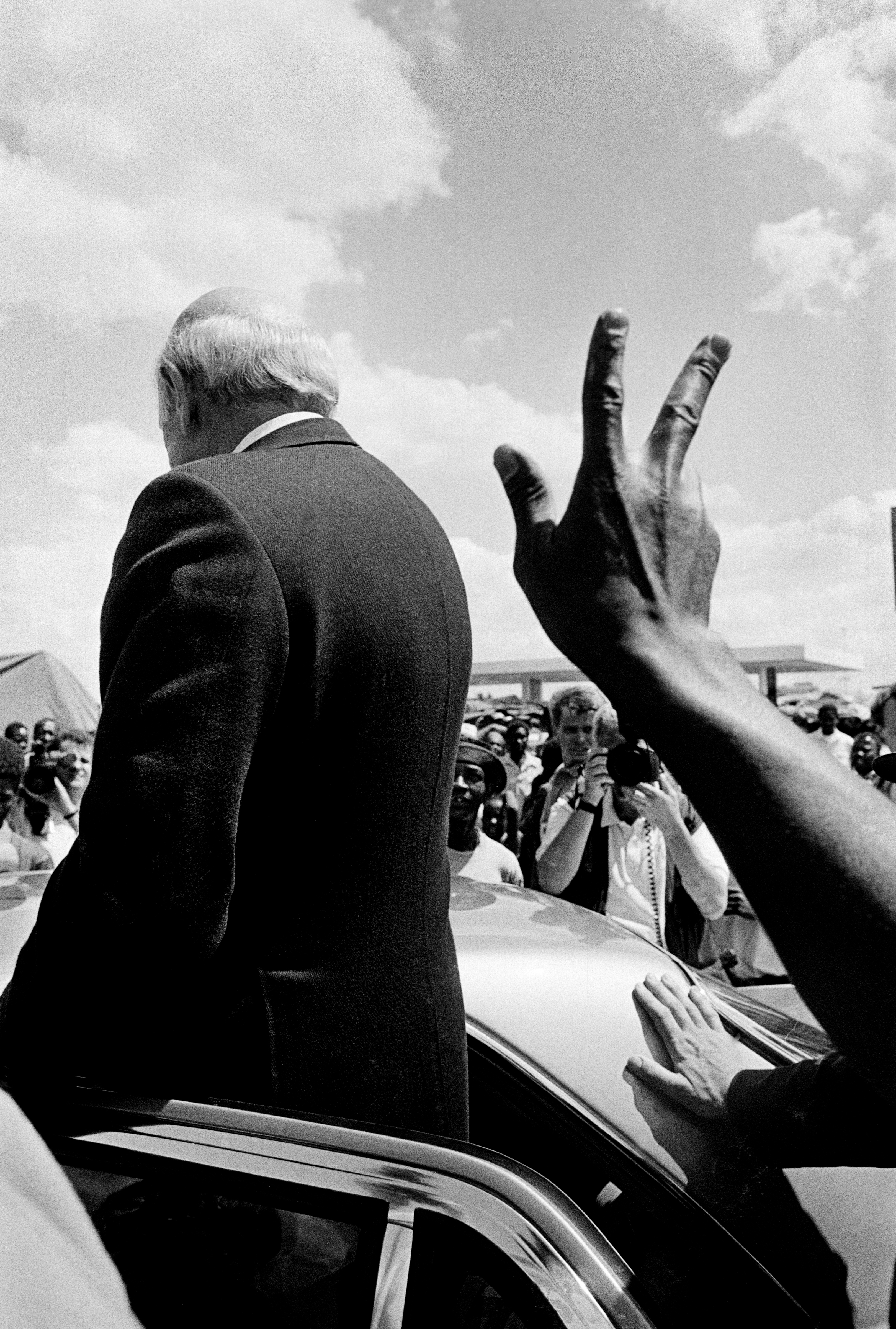
FW De Klerk campaigns in Soweto, April 1994. (Photo: Paul Weinberg)
Long wait
Far from the TV screens that beamed Mandela voting for the first time, in the far-flung rural areas, the waiting continued. Many voting stations had run out of ballot papers. The IEC was in crisis. The Ops Room had turned into a War Room. The notion that ballot papers needed to be printed outside the country for security reasons was abandoned. Innovative options were in full swing as local printers printed millions of ballots, throughout the day and night. The two-day election turned into four days. Ballots cast, distribution was now a logistical nightmare. To the rescue came the South African army and air force, institutions that had been central to the maintenance of apartheid. With precision and speed, they delivered millions of ballots to inaccessible outlying areas. Trained helicopter and Dakota pilots were now saving South Africa’s first democratic election. This little-known fact confirms the near miracle of the birth of the new South Africa.
Read more in Daily Maverick: SA’s 1994 election was saved by a Kenyan — the fascinating story of Washington Okumu, the accidental mediator
There were other dramas. On a visit to the then president of Bophuthatswana, Lucas Mangope, Judge Johann Kriegler, the chairperson of the IEC, informed him that the homeland government would be disbanded after the election and that everything would now fall under North West province. Mangope’s fiefdom and the apartheid homeland was at its end. He argued strongly against this to the impervious judge. In the end Mangope reluctantly resigned himself to the future, with his head buried in his hands.
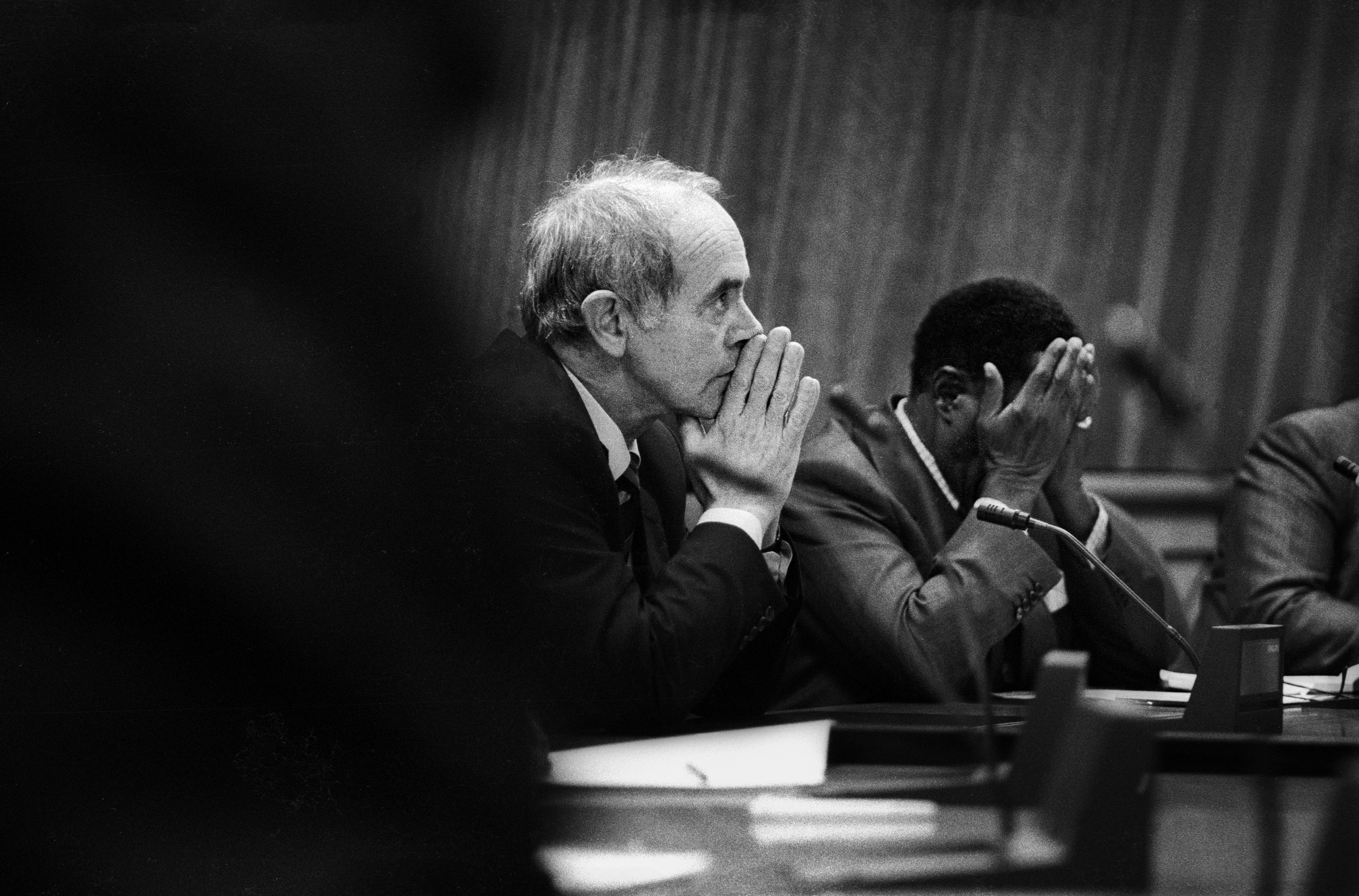
Judge Johann Kriegler, head of the Independent Electoral Commission, visits Lucas Mangope, then premier of Bophuthatswana, in the run-up to the 1994 elections. (Photo: Paul Weinberg)
I travelled with delegates of the commission to visit Ulundi, the headquarters of the KwaZulu-Natal homeland, to continue the negotiations with Chief Mangosuthu Buthelezi and the IFP. Unlike Mangope, Buthelezi was in high spirits. He held the IEC in his thrall as he prevaricated on the IFP’s participation in the election. Judge Kriegler and commissioner Oscar Dhlomo sat nervously wringing their hands as speaker after speaker rallied the crowd in Zulu as if they were the amabutho (warriors) preparing for battle. It was genuinely frightening. At last, the encounter ended – but still there was no commitment to the election. The long walk back to the chartered plane felt like failure. After many more rounds of negotiations, and at the 11th hour, Buthelezi conceded. The IFP would participate in the election. The relief was palpable through the commission, the country and the world. Another catastrophe had been averted.
A young white boy was nonchalantly eating an apple, sitting in front of a bank of television screens broadcasting Mandela’s inauguration speech, innocently oblivious to the importance of the occasion.
The delayed vote was followed by the delayed count, only to exacerbate the tension. But eventually, after five days, it was resolved. And then the final climactic announcement of the results – 20 million (86.9 %) South Africans had voted in the first “free and fair” elections. The ANC secured 63%, the National Party 20% and the IFP 11%. Democracy had finally arrived. A moment to savour and celebrate.
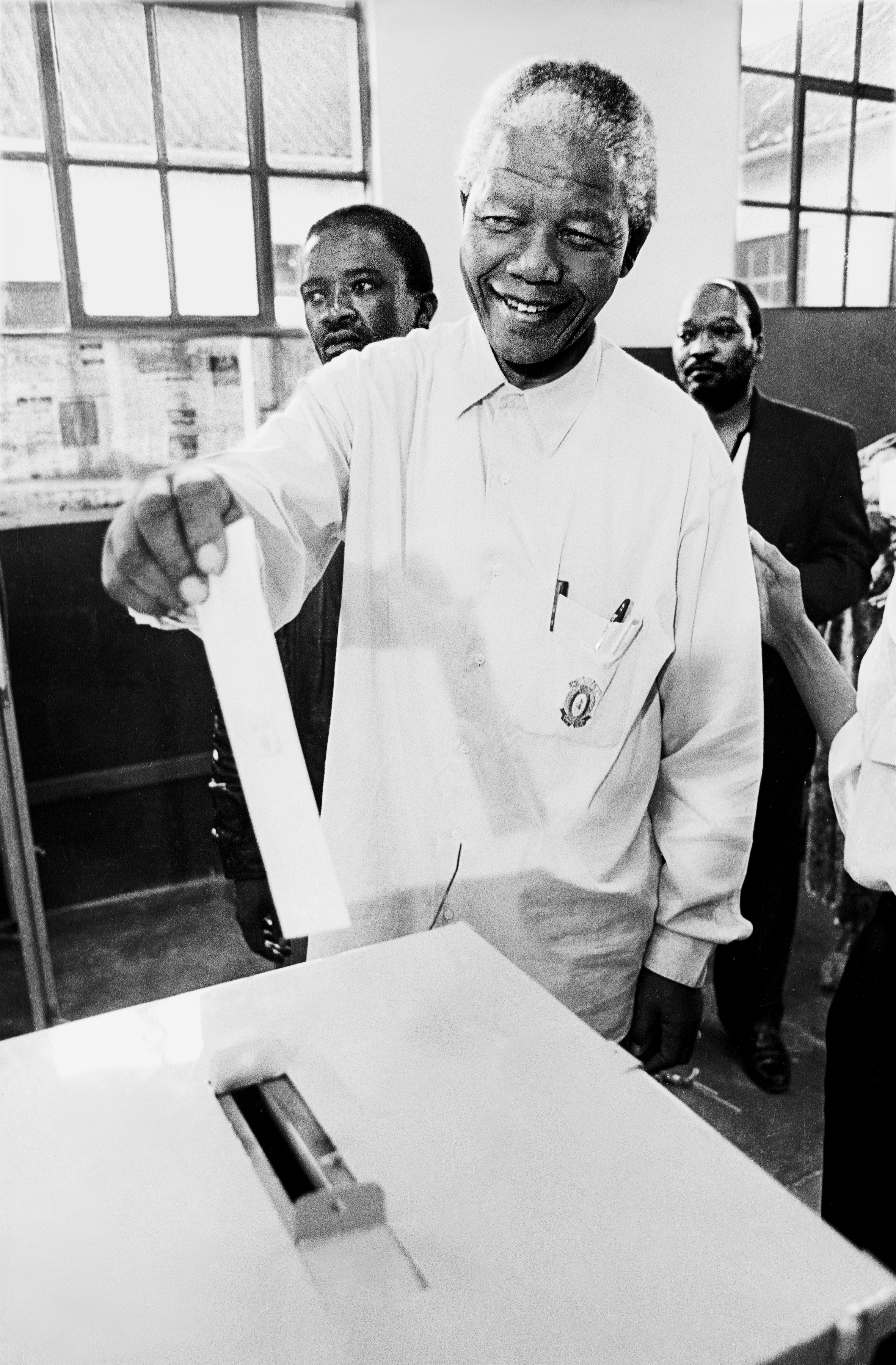
Nelson Mandela votes for the first time in his life, at Ohlange School in Inanda. (Photo: Paul Weinberg)
With the results behind us, there was one more important photograph to take for the record: the inauguration of the new president of South Africa. For some inexplicable reason, I was denied accreditation. Maybe the authorities felt that the IEC’s role was over. I joined the crowd at the Union Buildings to witness the event. As often happens in documentary photography, it is not the obvious photo that is the most interesting. There is always another perspective, another take, and as so often happens, it came my way.
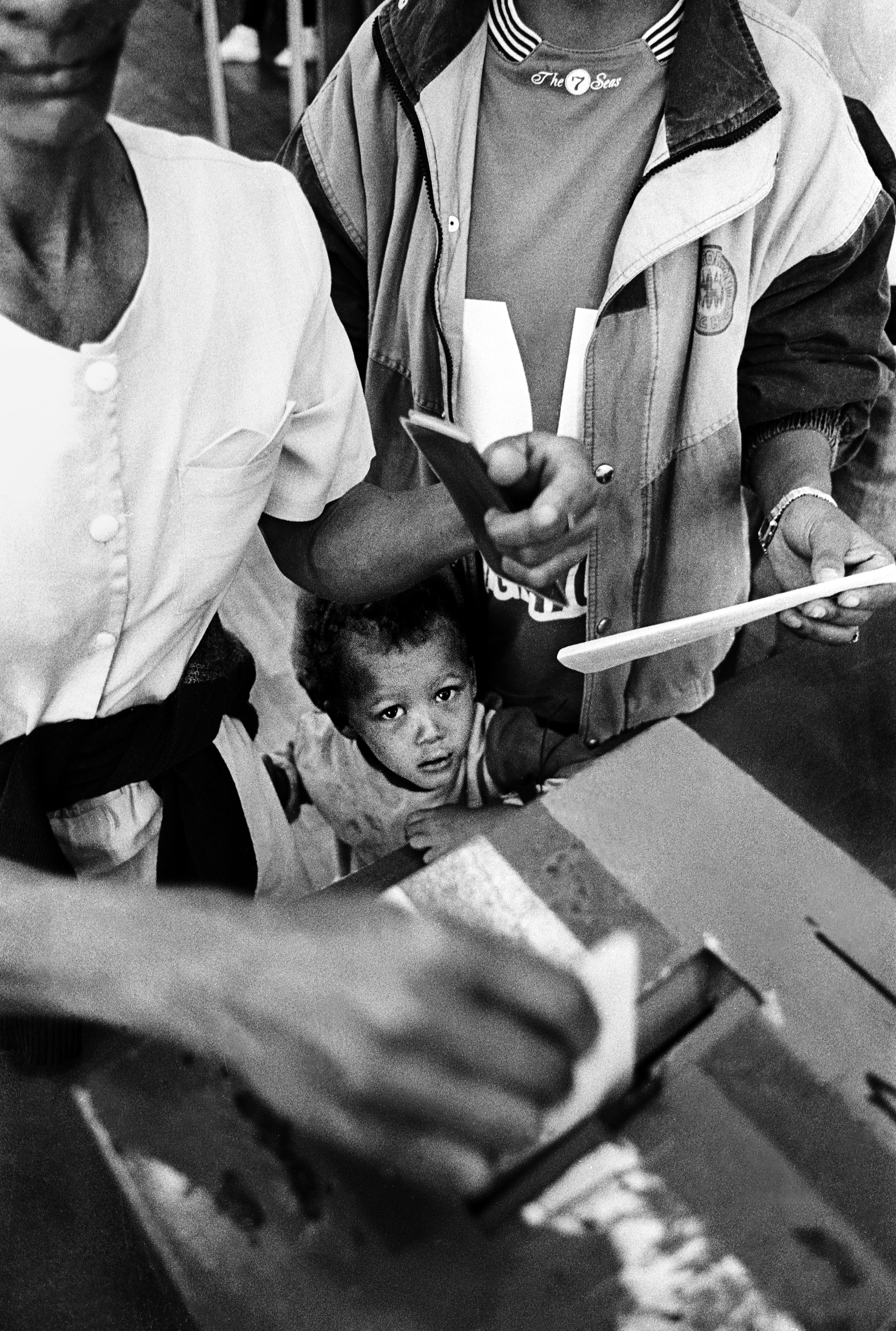
Johannesburg: Voting during the historic elections on 27 April 1994. (Photo: Paul Weinberg)
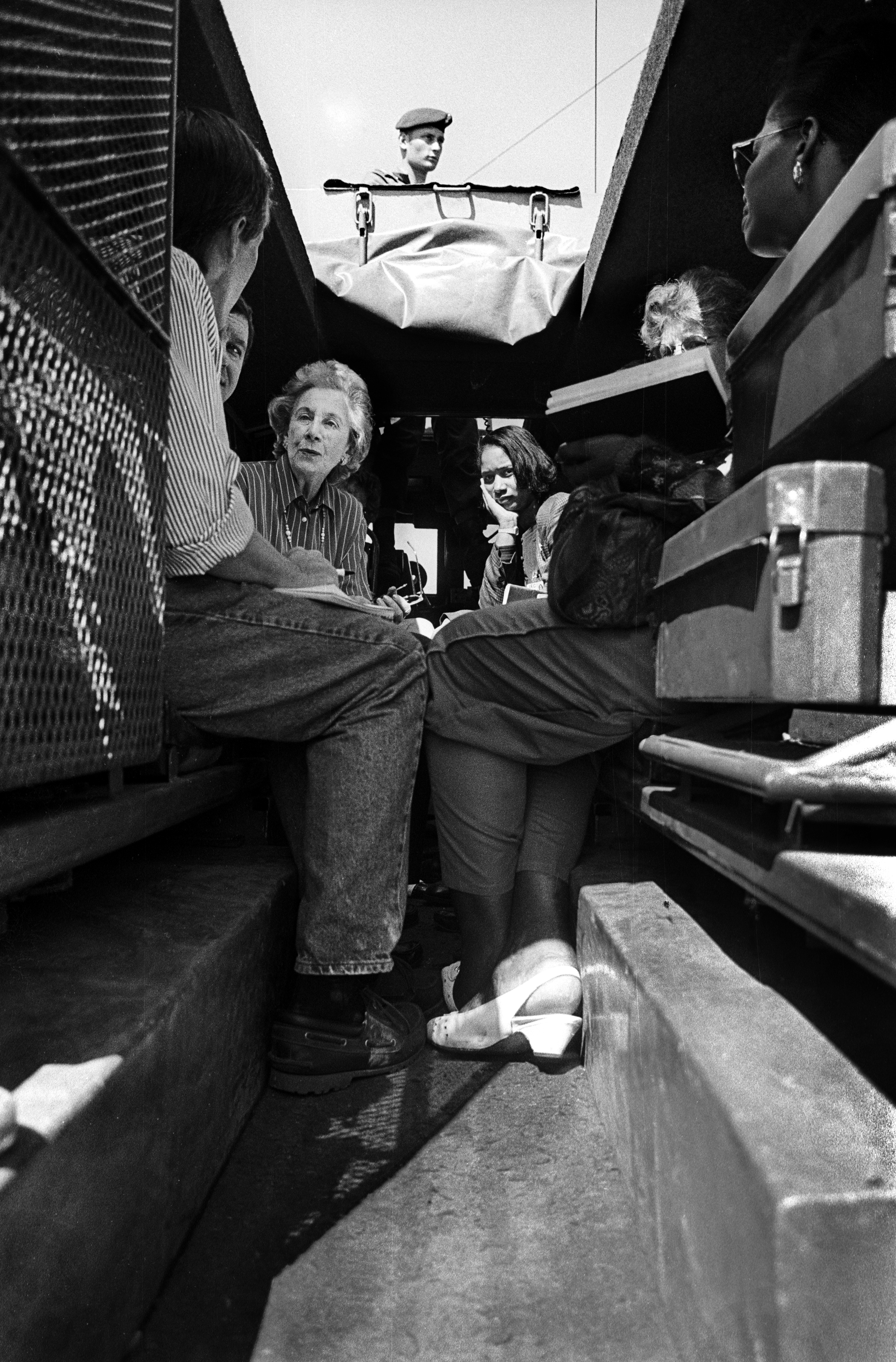
East Rand, Gauteng: Helen Suzman, human rights veteran and IEC commissioner, visits Katlehong before the elections. (Photo: Paul Weinberg)
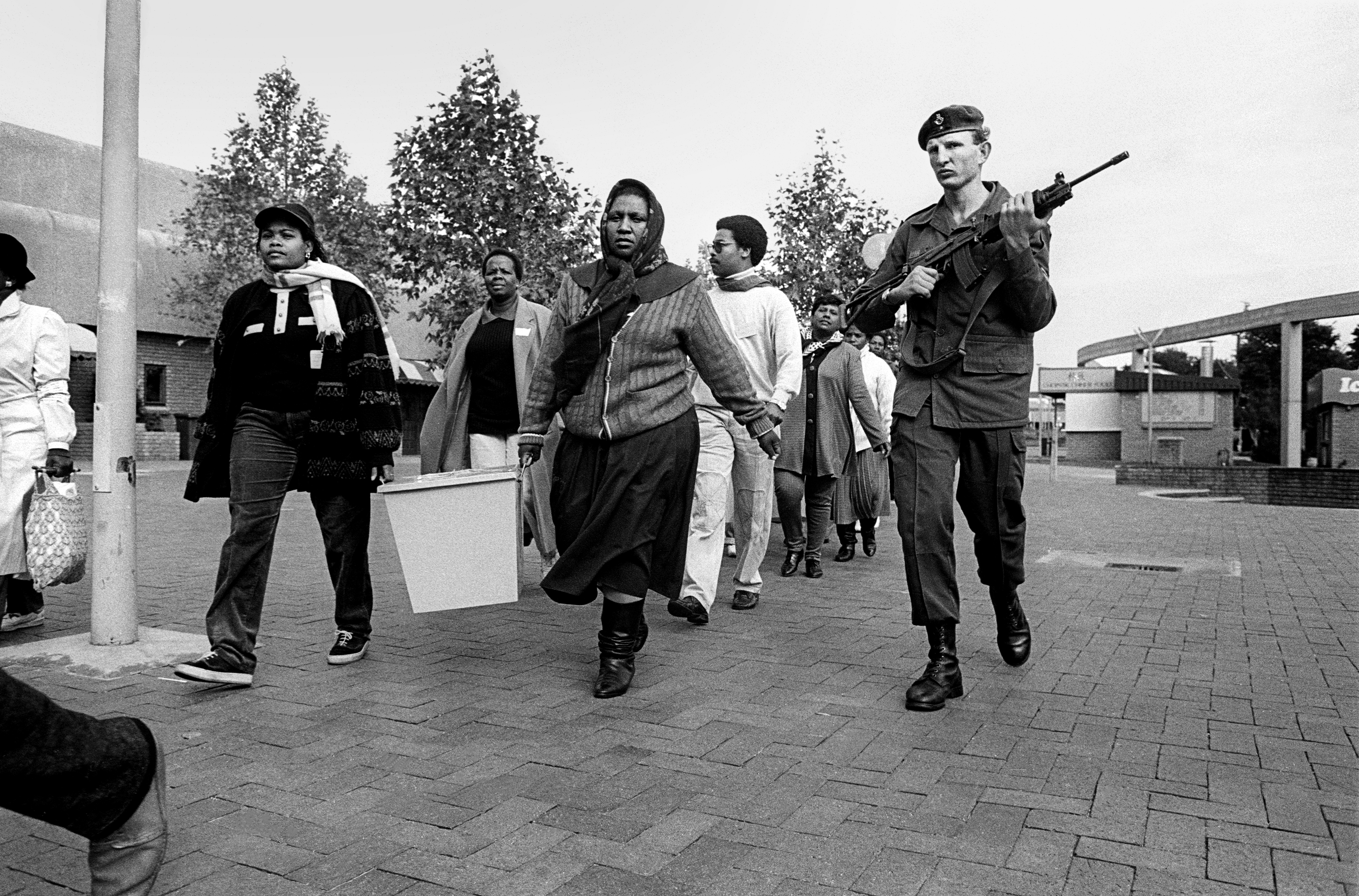
Johannesburg: Tight security for counting the vote. (Photo: Paul Weinberg)
A young white boy was nonchalantly eating an apple, sitting in front of a bank of television screens broadcasting Mandela’s inauguration speech, innocently oblivious to the importance of the occasion. When I looked at the multiracial crowd who had appeared in very large numbers, I saw in the expressions on their faces that the past was behind us. People were overwhelmingly happy that at last we were free. But I also noticed a sense of uncertainty and curiosity about what the future could bring.
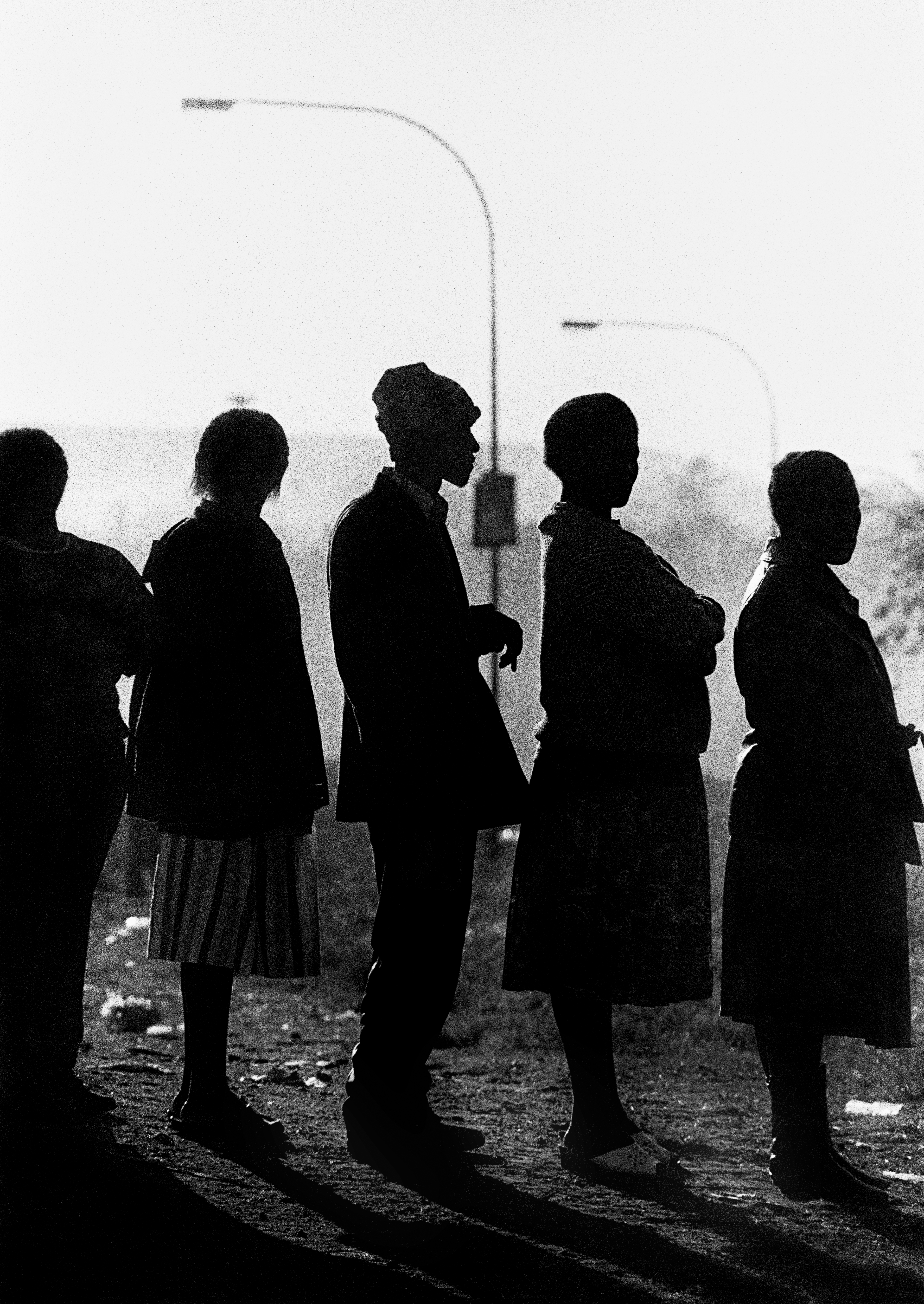
Voters line up on 27 April 1994. (Photo: Paul Weinberg)
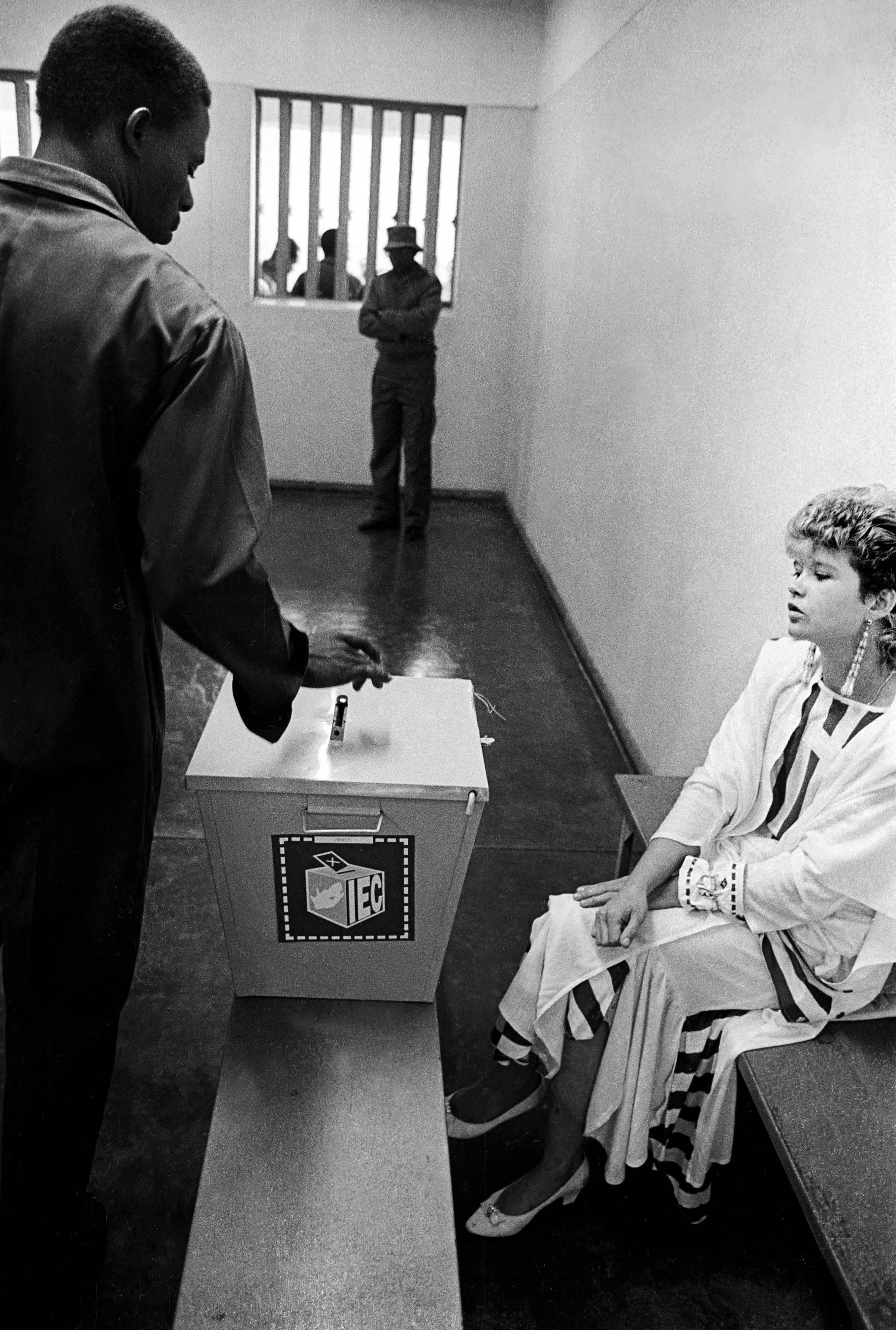
The IEC oversees voting in Diepkloof prison in April 1994. (Photo: Paul Weinberg)
On reflection, my most memorable recollection of the election process was of observing the drama behind the scenes. Committed IEC staff throughout the country worked tirelessly to deliver the first democratic elections. Afrikaans-speaking tannies, once staunchly loyal National Party government employees, young black revolutionaries consumed with confidence about the immediate future, human rights activists of all persuasions, worked together to deliver a new South Africa. It was immensely heartwarming. Something like the Springbok World Cup rugby team of 2023, but on steroids. I bottled it and I am proud to have been a discrete part of this beautiful, imperfect journey. I return to it regularly when I need to recharge my spirits and reset the values that were so permanently inscribed in all of us 30 years ago.
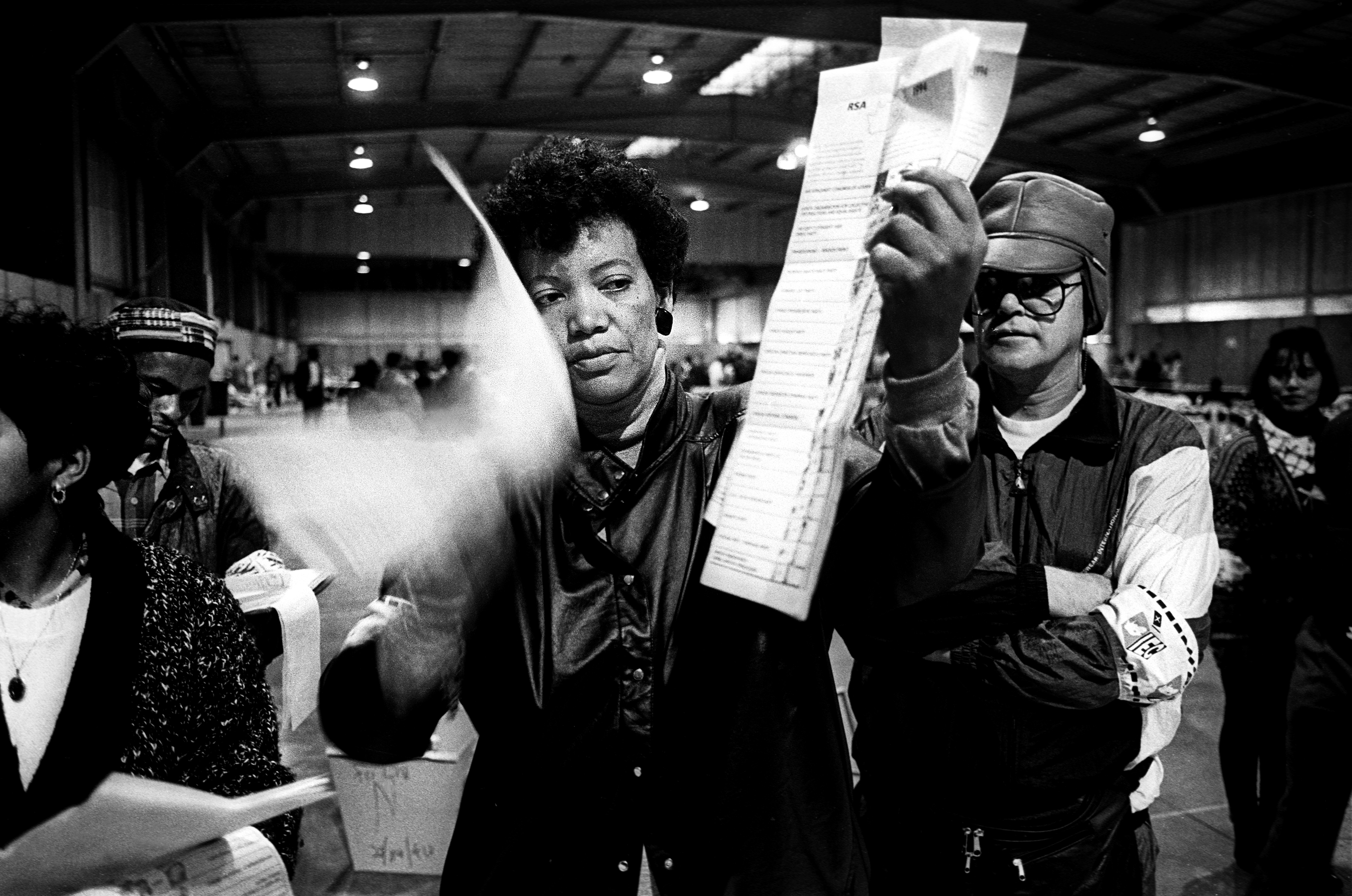
Soweto: Counting the votes. (Photo: Paul Weinberg)
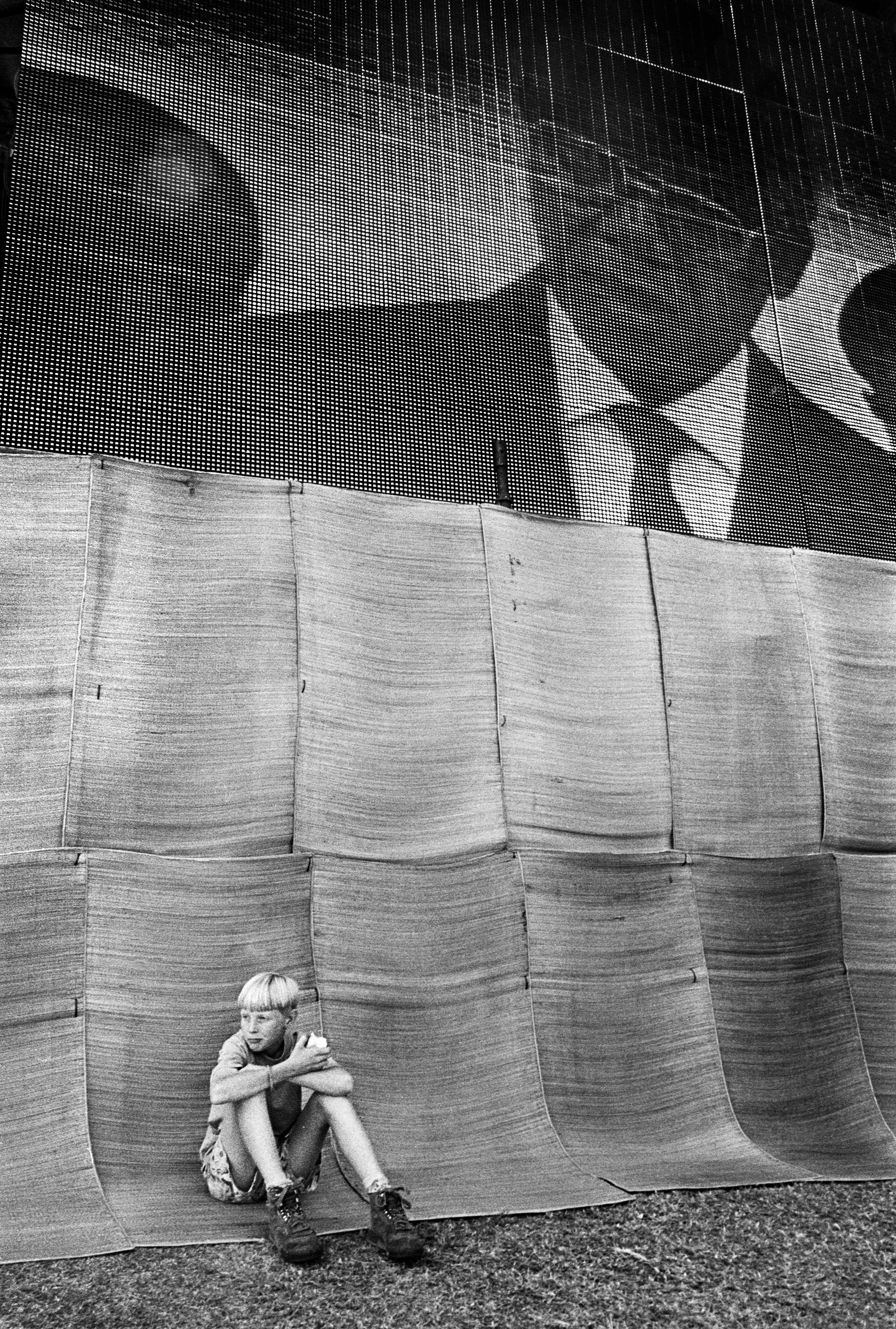
A young boy at the inauguration of Nelson Mandela, Pretoria, May 1994. (Photo: Paul Weinberg)
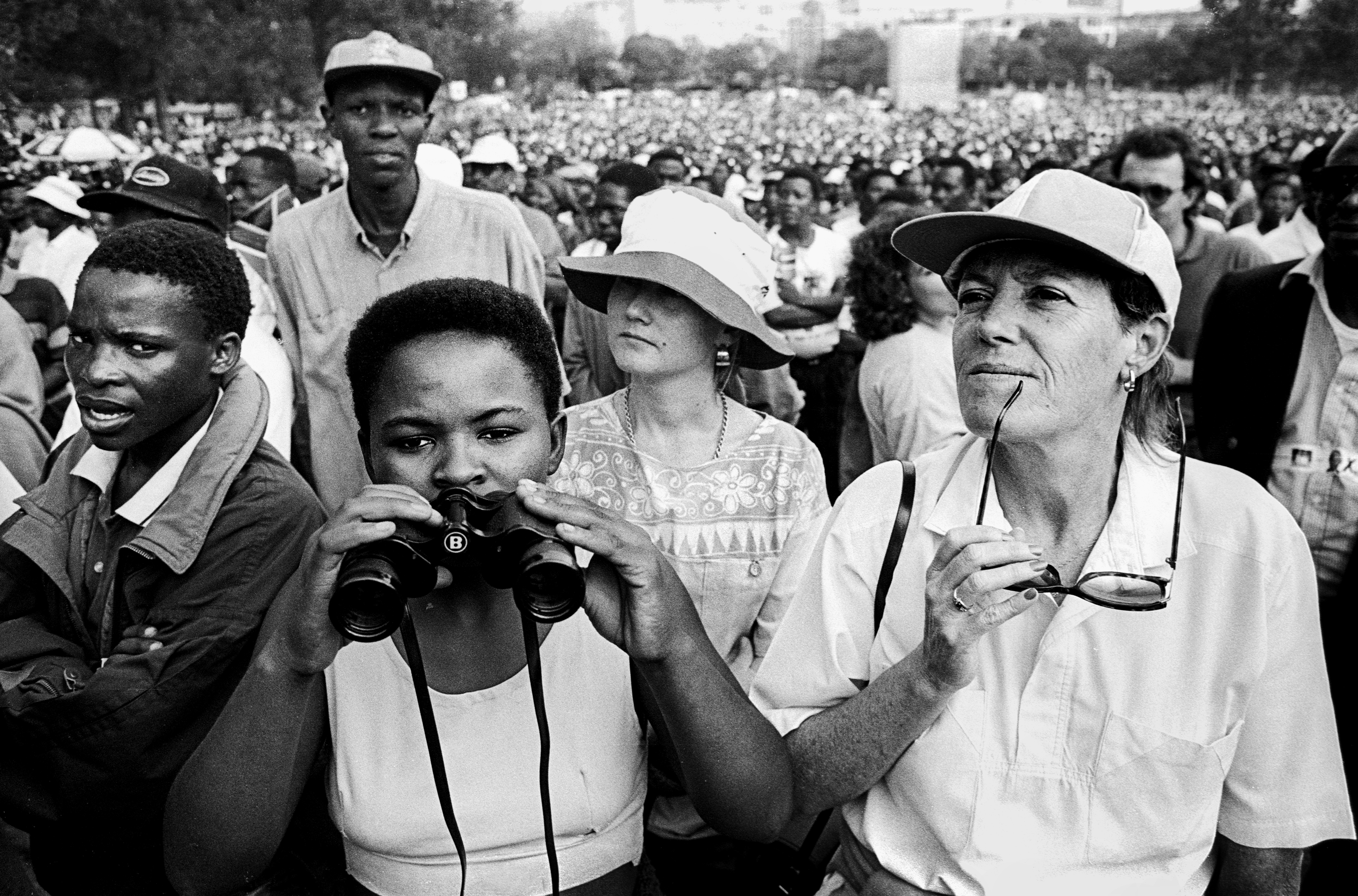
Pretoria: The inauguration of Nelson Mandela on 5 May 1994. (Photo: © Paul Weinberg)
However, it was Judge Kriegler’s prescient observation that most eloquently summed up the election moment: “With the knowledge of hindsight, I would do it all over again. The irony is that if the elections had gone off like clockwork, they would have been less of an exemplary lesson in national unification. It was a national convulsion and it worked.” DM
Paul Weinberg is a photographer, curator, filmmaker, writer, educationist and archivist. He began his career in the early 1980s and was a founding member of Afrapix and South. He is presently curator for the Photography Legacy Project – www.plparchive.com.
Weinberg will be in conversation with Professor Pumla Gobodo-Madikizela at 1pm on Tuesday, 30 April, at the opening of the photographic exhibition, An End to Waiting, at the Stellenbosch University Museum.
Read more in Daily Maverick: 2024 elections
















What took 372 years to evolve, develop and prosper took the ANC just 30 years to undo.
Nothing the ANC has done since becoming the ruling party has been for the best interest of all South Africans.
Should they lose the upcoming election will they hand the keys over? You can bet your last cent that they won’t.
To be fair, nothing any of the governments prior to the ANC did was in the best interests of all South Africans either, so nothing has changed in 400 years, then….
I remember the fear and anxiety of the months leading up to the election, seemingly never really recovering from the Hani assassination, and then the magic of the day itself and the weeks after that. Complete strangers smiling at each other on the streets of Joburg, the feeling we could do anything, the World Cup a year later. How amazing it would be to recapture that.
Thank you Paul. You and the others who documented this South African miracle. Growing up, we had very little knowledge of our own history. We were taught a very different kind of history. I actually thought the great Mandela was a legend from a distant past. All the toy toying to ‘bring back Nelson Mandela!” seemed to be part of what was done just to vent anger. It wasn’t until I actually saw him on TV that I realised that he was real. No one would talk about it, if they did as kids we would probably not be in ears shot. There was so much fear.
Even now seeing his beautiful majestic smiling face gives me chills. His dance moves brought so much joy! Knowing that I am not that brave so as to dare what he and so many dared and achieved. What they sacrificed. It’s truly humbling. I question what have I done. What can I do. What will I do?!
So grateful Tata. You did your bit. Rest eternally in peace. May none of what happened afterwards be used to take away your glory. You all who bravely led us to freedom. Thank you 💓
Lekker, Paul. Great photos, great memories and a pleasure to read. Never mind the white whingers who long for the old days of privilege when apparently everything ‘prospered’ – for them, that is. We all know who was on the right side of history, and have not forgotten the evil that went before it. Master of the lens, you!